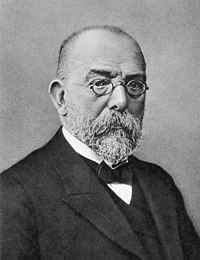
Back فرضيات كوخ Arabic Postulats de Koch Catalan بەدەستھاتەکانی کۆخ CKB Kochovy postuláty Czech Kochs postulater Danish Henle-Koch-Postulate German Postulados de Koch Spanish Kochi postulaadid Estonian Kochen postulatuak Basque انگاره کخ Persian

Koch's postulates (/kɒx/ KOKH)[2] are four criteria designed to establish a causal relationship between a microbe and a disease. The postulates were formulated by Robert Koch and Friedrich Loeffler in 1884, based on earlier concepts described by Jakob Henle, and the statements were refined and published by Koch in 1890.[3] Koch applied the postulates to describe the etiology of cholera and tuberculosis, both of which are now ascribed to bacteria. The postulates have been controversially generalized to other diseases. More modern concepts in microbial pathogenesis cannot be examined using Koch's postulates, including viruses (which are obligate intracellular parasites) and asymptomatic carriers. They have largely been supplanted by other criteria such as the Bradford Hill criteria for infectious disease causality in modern public health and the Molecular Koch's postulates for microbial pathogenesis.[4]
- ^ Koch R (1876). "Untersuchungen über Bakterien: V. Die Ätiologie der Milzbrand-Krankheit, begründet auf die Entwicklungsgeschichte des Bacillus anthracis" [Investigations into bacteria: V. The etiology of anthrax, based on the ontogenesis of Bacillus anthracis] (PDF). Cohns Beiträge zur Biologie der Pflanzen (in German). 2 (2): 277–310.
- ^ "Koch". Random House Webster's Unabridged Dictionary.
- ^ Evans AS (October 1978). "Causation and disease: a chronological journey. The Thomas Parran Lecture". American Journal of Epidemiology. 108 (4): 249–258. doi:10.1093/oxfordjournals.aje.a112617. PMID 727194.
- ^ Fredricks D, Ramakrishnan L (April 2006). "The Acetobacteraceae: extending the spectrum of human pathogens". PLOS Pathogens. 2 (4): e36. doi:10.1371/journal.ppat.0020036. PMC 1447671. PMID 16652172.
© MMXXIII Rich X Search. We shall prevail. All rights reserved. Rich X Search